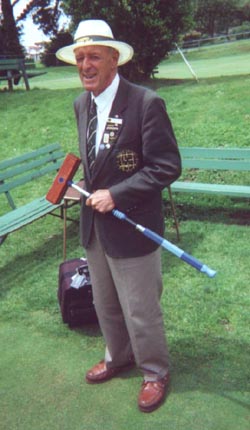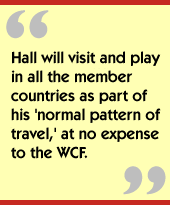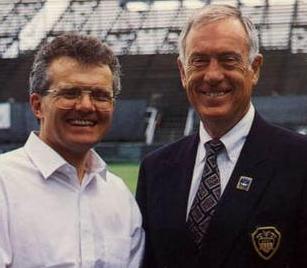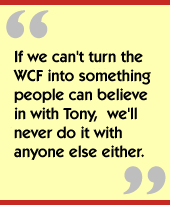

|
Back to |
| The Front Page |
| Archives |

|
Tony Hall accepts WCF presidency by Bob Alman Posted April 17, 1999 |
|
||||||
The next president of the World Croquet Federation, along with the organization's new Management Committee, will be tackling many tough issues facing the fledgling organization as its member roster begins to encircle the globe: how inclusive the organization will be in promoting all forms of the sport; how effective the WCF will be in creating consistent international standards, from rules to handicaps; what relationship the WCF should have to the MacRobertson Shield and how a "world teams" competition should be organized and managed; what financial commitments must be made by the hosts of an officially sanctioned WCF event; and how the organization can be effectively financed to achieve its goals.

|
| Tony Hall with his runner-up trophy at the 1996 San Francisco Open. |
Hall is a remarkably young 67 with an active interest in hockey and other sports. (In May he is touring Australia as a player with the Ancient Britons veterans hockey team.) He is in some ways a walking caricature of the Ozzie hale-fellow-well-met: it's simply not possible to dislike him. From our interview (at the end of this article) it is clear that he regards his worldwide network of friendships as one of his chief assets as ambassador and negotiator for the Federation.
Hall's personal style and popularity could turn out to be a critical unifying force in the years ahead. The WCF has come under sharp attack for its management of world championship events and its goals for world team competitions, for the way its financial resources are handled, and for its hard-line approach to negotiations with potential sponsors of WCF events. Up to now, Secretary-General Chris Hudson has had to take the heat for this criticism, whether warranted or not.
As a widower with three grown children and a retiree from the Australian army since 1987, Hall has long made frequent travel to croquet events in many countries a part of his personal regimen. He directly confronts the delicate issue of personal expenses with an unconditional declaration that he will visit and play in all the member countries as part of his "normal pattern of travel, at no expense to the WCF." He also expects to attend all World Championships as well as the MacRobertson Shield contests during his term of office.

Hall is no slouch as a player and has successfully competed in every form of the sport. He has played in the Australian Croquet Championships every year since 1990, representing his own state of New South Wales this year. He has played in the British, New Zealand, and United States Association Croquet National Championships. He has been runner-up in the Victorian Open (International Rules) and the San Francisco Open (American Rules) and is current Australian and Irish Golf Croquet Doubles Champion.
Hall's credentials as an organizer are just as impressive. He is current Senior Vice-President of the Australian Croquet Association and President of a major club - the Canberra Croquet Club - having served terms as Secretary, Treasurer, and Vice-President. He got high marks for his energetic management of the Croquet Players' Association of New South Wales, as president for three years of this official state organization with more than 1800 players and 65 clubs.
Hall was the convener of the WCF Golf Croquet Working Party which produced the official WCF Golf Croquet Rules and was Tournament Referee of the recent Golf Croquet World Championships at Leamington Spa. In 1995 and 1996 he was Tournament Referee at Somoma-Cutrer.
Hall takes up the presidency of the WCF as his term on the Management Committee expires, along with the terms of Colin Irwin and Antoine Ravez.

|
| Former WCF president Fred Rogerson, Dublin, Ireland, (L) and Bill Berne, Lumberton, North Carolina, outgoing WCF president. |
The public role of the WCF president is not narrowly defined by the by-laws of the WCF and has been variable. Fred Rogerson of Ireland was at times quite outspoken publicly on the thorniest of issues, while outgoing president Bill Berne has kept a low profile, leaving the job of spokesperson to Secretary-General Chris Hudson. It's clear that Tony Hall intends be the most active and publicly visible president so far. In characteristic fashion, he was quick to respond to each of our questions:
QUESTION: How were you persuaded to take on a job some might describe as thankless?
After seeing the progress made by the WCF, both at the Association World Championships in Bunbury and the Golf Croquet World Championships in Leamington Spa, I was disappointed that so few players seem to know or appreciate what has been done. The lack of knowledge about the WCF made me an instant advocate. When Quentin MacArthur-Stanham suggested I was well placed to reflect Australia`s interests [by being] on the WCF Management Committee I realized that was true, mostly due to the amount of traveling and playing I have been able to do.
From my position on the Management Committee I found out even more and realized how modest Chris Hudson is. The progress already achieved is enormous and I felt I wanted to tell everyone. Also, my reading of the croquet [E-mail] lists has made me realize that there are a number of areas in which the WCF can play a significant leadership role.
There is a need for an independent agency to coordinate the world-wide aspects of our sport that until now have been coordinated by cooperation between the major croquet playing countries. There comes a time when progress cannot be achieved if every member of an organization has a veto. Good management demands that decisions be made by majority if unanimity is not reached. With the friends I have made in the world-wide croquet community, I think I can help our sport go further forward.
QUESTION: Fred Rogerson as president was sometimes remarkably vocal, while Bill Berne as current president has stayed in the background, leaving the spokeperson job almost entirely to Chris Hudson as Secretary-General. Will you be an active spokesperson for the WCF?
Yes, I will be vocal whenever I have time to do so. With the traveling and playing which I have enjoyed over the last few years (and which I intend to continue) there is not always as much time to write as much as I would wish.
The speed at which a topic proceeds on the Internet sometimes leaves me behind, particularly if I have been in transit - or playing three games a day!
QUESTION: Your blurb in the WCF press release says you will visit and play in all member countries as part of your normal pattern of travel. All member countries, Tony? Isn't that a tall order - even if you don't go to the Observer member countries?
Luckily for my financial well-being, there are only twenty countries in the WCF at present, although I hope that number will be increasing.
This June and July I will visit Canada, Wales, England, Germany, Jersey, hopefully Switzerland, and possibly Guernsey and Scotland. Next year I will be in New Zealand for the MacRobertson Shield and hope to get to the U.S. in May, calling in on Japan and Hawaii on the way there or back. That only leaves South Africa, Egypt and the remaining European countries (Belgium, France, Italy, the Netherlands, Spain and Ireland) which I will probably be able to get to in 2001. I place great store in personal contact, which is the key to proper understanding and good cooperation and which, once established, makes many things possible that would otherwise be unthinkable.
QUESTION: You include the "standardization of rules and procedures" as among your goals. Do you see the existing logjam in the Working Party on revision of the laws being broken any time soon?
The international laws discussions on the Laws of Association Croquet are, unfortunately, not headed by anyone but are a cooperative endeavor between the CA, the NZCC, the USCA and the ACA, with the lead usually taken by the CA. I have great hopes that there will be some resolution soon, however I note the posting to the Nottingham mailing list by Stephen Mulliner today which includes: "... Sadly, an issue then arose within the CALC and things halted. It doesn't please me ...". I trust that the CA will be working towards resolving the problem before too long.
One area of standardization which I am keen to progress is regarding the Standard Court, Equipment and Accessories. It seems to me that there would be significant advantages if these rules were to be standard between Association Croquet, USCA Rules and Golf Croquet, so that the same courts, equipment and accessories will be assured of being legal in the three versions.
QUESTION: Can you describe in your own words what your working relationship will be with Hudson and the members of the WCF Management Committee?
Despite traveling a lot I presume that most business will continue to be transacted by mail and email. I hope that all members of the committee will gain access to regular email if they do not already have it.
QUESTION: Can you tell me what it is you would like to achieve in this post?
That is an excellent question. I have considered my answer for some time and believe I can list the most important things that the game needs. I expect to obtain support from all the administrations concerned, as I have already met a majority of the administrators, who have not been backward in stating their ideas. There is good agreement on what is needed:
1. The continued expansion of the WCF to include all countries in which the game is played and expansion of the game within the existing members.
2. The adoption of a workable system of regular revision of the rules. Evolution is necessary if the game is not to stagnate.
3. The adoption of a world-wide system of handicapping.
4. The adoption of world-wide regulations affecting play that are standard. This could be achieved by including regulations that affect play as part of the rules of the games.
5. Conduct of regular, high profile world championships to provide a focus for the general expansion of the game and to recognize and honor the best players.
6. Better communication between players and administrators and between the administrations of the member countries of the WCF.
QUESTION: Will you articulate briefly your personal vision of the role of the WCF in promoting croquet internationally in the first decade of the new century?
The WCF has been developing well and is now the accepted world body. The opportunity exists for leadership in sorting out some things that have not been progressing as well as they could. Good administration leads to good events, good publicity, good fun and better play. The major role of the WCF is to ensure that the game is well administered.
QUESTION: WIll you say anything else you'd like to say that I haven't asked?
I thank all those who have given me the privilege of serving as President. I will do my utmost to repay their confidence in me.
[This report is based on a press release of the WCF and E-mail interviews with some of the principals.]
